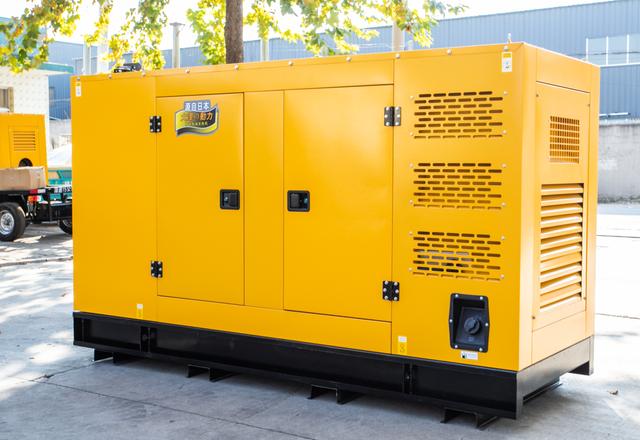Diesel Generators for Sustainable Power Harnessing Efficiency and Innovation
Introduction: In an era marked by increasing climate change concerns and a growing focus on sustainability, the need for reliable and efficient power solutions has become paramount. While renewable energy sources like solar and wind power have gained significant attention, diesel generators continue to play a crucial role in providing sustainable power. This article explores the various aspects of diesel generators, their advantages, and their potential for integration with renewable energy sources, all with the aim of achieving a more sustainable and resilient power infrastructure. 1. Understanding Diesel Generators: 1.1. Overview of Diesel Generators: Diesel generators are robust and versatile power generation systems that utilize diesel fuel as a source of energy. They consist of an internal combustion engine coupled with an alternator to produce electricity. These systems can be employed in various applications, ranging from residential and commercial settings to industrial and remote locations. 1.2. Working Principle of Diesel Generators: The working principle of diesel generators involves the conversion of chemical energy stored in diesel fuel into mechanical energy, which is then converted into electrical energy. The combustion process, along with the mechanical components, such as pistons, crankshafts, and generators, work together to generate electricity efficiently. 2. Advantages of Diesel Generators: 2.1. Reliability and Durability: One of the key advantages of diesel generators is their reliability and durability. Diesel fuel has a higher energy density than other fuels, enabling generators to produce more power efficiently. Additionally, diesel generators have a longer lifespan, require less maintenance, and have a greater tolerance for heavy loads and extreme weather conditions. 2.2. Fuel Availability and Flexibility: Diesel fuel is readily available worldwide, making diesel generators a viable power solution in remote or off-grid locations. Furthermore, these generators can also run on alternative fuels, such as biodiesel, which contributes to reducing carbon emissions and dependence on fossil fuels. 2.3. High Efficiency and Reduced Energy Loss: Diesel generators are known for their high energy efficiency, which results in lower fuel consumption and reduced energy loss during the power generation process. This translates into cost savings, making diesel generators an attractive option for both short-term and long-term power requirements. 2.4. Quick Start-up and Load Response: Diesel generators offer the advantage of quick start-up times and rapid response to changing load demands. This capability is particularly valuable in emergency situations or for critical applications where uninterrupted power supply is essential. 3. Integration with Renewable Energy Sources: 3.1. Hybrid Power Systems: The integration of diesel generators with renewable energy sources forms the basis of hybrid power systems. These systems combine the benefits of both diesel generators and renewable energy technologies, such as solar and wind power, to provide a reliable and sustainable power supply. 500kw diesel generator for backup power act as a backup or supplementary power source, ensuring uninterrupted electricity during periods of low renewable energy production or high demand. 3.2. Load Management and Energy Storage: Integrating energy storage systems, such as batteries, with diesel generators can further enhance their sustainability. By storing excess renewable energy during peak generation periods, these systems can supplement power requirements during periods of low generation or high demand. This approach optimizes fuel consumption and reduces emissions, while providing a stable and continuous power supply. 4. Environmental Considerations: 4.1. Emission Control Technologies: Diesel generators have traditionally been associated with higher emissions of pollutants, such as nitrogen oxides (NOx) and particulate matter (PM). However, advancements in emission control technologies have significantly reduced these emissions. The use of catalytic converters, diesel particulate filters, and selective catalytic reduction (SCR) systems can effectively mitigate the environmental impact of diesel generators. 4.2. Transition to Cleaner Fuels: The adoption of cleaner fuels, such as ultra-low sulfur diesel (ULSD) and biodiesel, has the potential to further reduce the environmental footprint of diesel generators. ULSD has significantly lower sulfur content, resulting in reduced emissions of sulfur dioxide (SO2), while biodiesel offers a renewable and carbon-neutral fuel option. 5. Future Trends and Innovations: 5.1. Smart Grid Integration: The integration of diesel generators with smart grid technologies enables efficient load management, demand response, and real-time monitoring. This integration optimizes energy consumption, reduces wastage, and enhances overall grid stability.  5.2. Hybridization with Alternative Power Sources: Diesel generators are increasingly being combined with emerging power technologies, such as fuel cells and microturbines, to create hybrid power systems. These systems leverage the unique advantages of each technology, resulting in greater fuel efficiency, reduced emissions, and improved sustainability. Conclusion: Diesel generators continue to be a vital component of the sustainable power landscape, offering reliability, flexibility, and efficiency. Through their integration with renewable energy sources and the adoption of advanced emission control technologies, diesel generators can contribute to a more sustainable and resilient power infrastructure. As technologies evolve and new innovations emerge, diesel generators will play an integral role in meeting the ever-growing global demand for sustainable power.
5.2. Hybridization with Alternative Power Sources: Diesel generators are increasingly being combined with emerging power technologies, such as fuel cells and microturbines, to create hybrid power systems. These systems leverage the unique advantages of each technology, resulting in greater fuel efficiency, reduced emissions, and improved sustainability. Conclusion: Diesel generators continue to be a vital component of the sustainable power landscape, offering reliability, flexibility, and efficiency. Through their integration with renewable energy sources and the adoption of advanced emission control technologies, diesel generators can contribute to a more sustainable and resilient power infrastructure. As technologies evolve and new innovations emerge, diesel generators will play an integral role in meeting the ever-growing global demand for sustainable power.